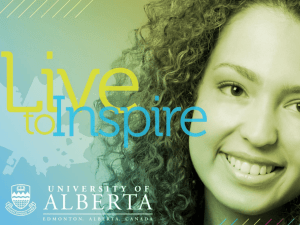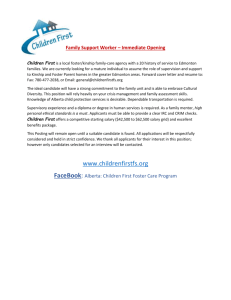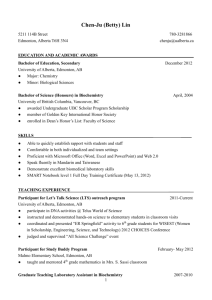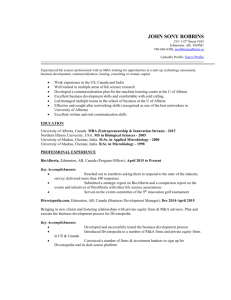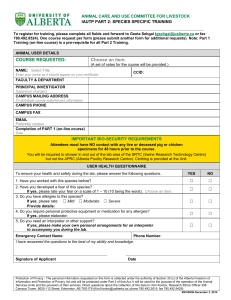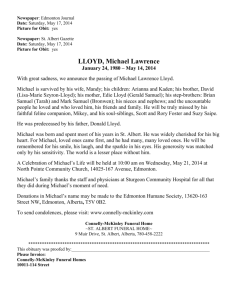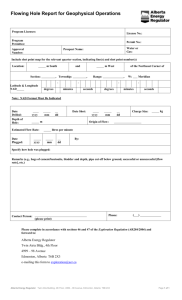Experience Report Chapter Zero: Personal Information
advertisement
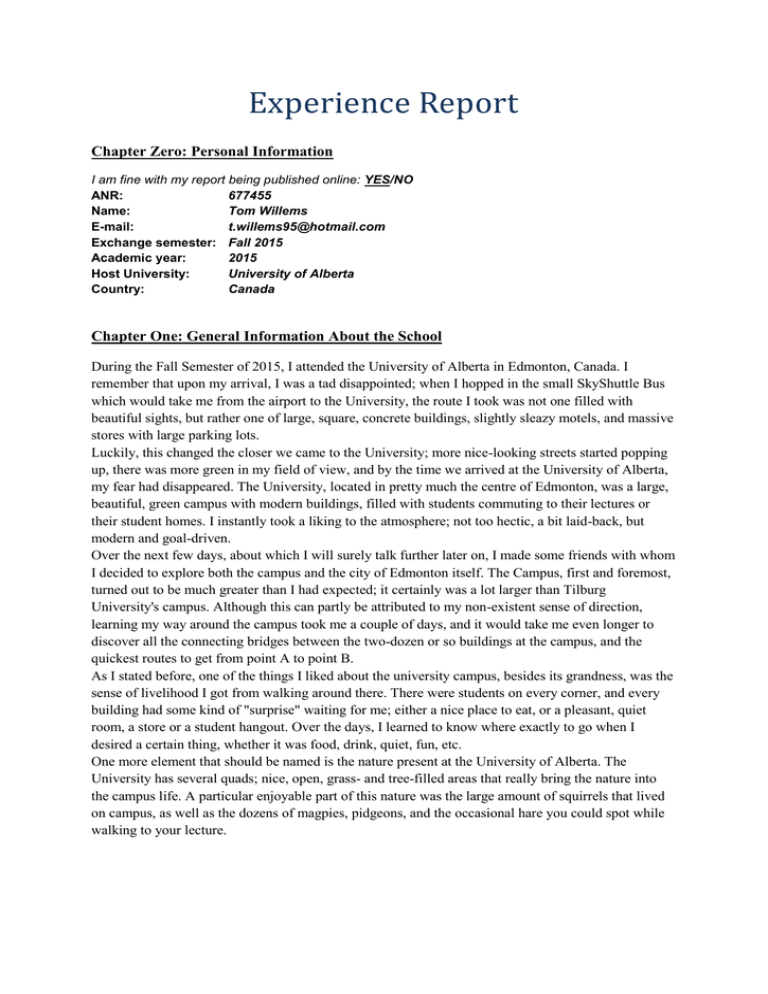
Experience Report Chapter Zero: Personal Information I am fine with my report being published online: YES/NO ANR: 677455 Name: Tom Willems E-mail: t.willems95@hotmail.com Exchange semester: Fall 2015 Academic year: 2015 Host University: University of Alberta Country: Canada Chapter One: General Information About the School During the Fall Semester of 2015, I attended the University of Alberta in Edmonton, Canada. I remember that upon my arrival, I was a tad disappointed; when I hopped in the small SkyShuttle Bus which would take me from the airport to the University, the route I took was not one filled with beautiful sights, but rather one of large, square, concrete buildings, slightly sleazy motels, and massive stores with large parking lots. Luckily, this changed the closer we came to the University; more nice-looking streets started popping up, there was more green in my field of view, and by the time we arrived at the University of Alberta, my fear had disappeared. The University, located in pretty much the centre of Edmonton, was a large, beautiful, green campus with modern buildings, filled with students commuting to their lectures or their student homes. I instantly took a liking to the atmosphere; not too hectic, a bit laid-back, but modern and goal-driven. Over the next few days, about which I will surely talk further later on, I made some friends with whom I decided to explore both the campus and the city of Edmonton itself. The Campus, first and foremost, turned out to be much greater than I had expected; it certainly was a lot larger than Tilburg University's campus. Although this can partly be attributed to my non-existent sense of direction, learning my way around the campus took me a couple of days, and it would take me even longer to discover all the connecting bridges between the two-dozen or so buildings at the campus, and the quickest routes to get from point A to point B. As I stated before, one of the things I liked about the university campus, besides its grandness, was the sense of livelihood I got from walking around there. There were students on every corner, and every building had some kind of "surprise" waiting for me; either a nice place to eat, or a pleasant, quiet room, a store or a student hangout. Over the days, I learned to know where exactly to go when I desired a certain thing, whether it was food, drink, quiet, fun, etc. One more element that should be named is the nature present at the University of Alberta. The University has several quads; nice, open, grass- and tree-filled areas that really bring the nature into the campus life. A particular enjoyable part of this nature was the large amount of squirrels that lived on campus, as well as the dozens of magpies, pidgeons, and the occasional hare you could spot while walking to your lecture. The City of Edmonton itself is what I decided to explore after I got the hang of the campus in the first few days after my arrival. One thing that I quickly learned, is that Edmonton is tremendously much larger than Tilburg is, or pretty much any city by Dutch standards. Whereas in the Netherlands you can usually take your bicycle into the city centre, or meet up with a friend at the other side of town by bicycle or bus, to get pretty much anywhere in Edmonton you will have to take either the bus or ride the subway system, or LRT. Another difference with Dutch cities as we know them, is that in Edmonton there isn't a kind of "City Centre"; a local spot where all the stores, restaurants, etc. are located. Instead, the city holds several shopping areas, but stores are also scattered all over town. In the time I was there, and I believe most other students chose the same as me, I usually went to three shopping areas; Whyte Avenue, located close to the University, which is a very long off-brand shopping street, Southgate, a large mall located about 15 minutes by LRT from the University LRT Station, and West Edmonton Mall, the biggest mall in North America, which, besides pretty much any store you could possibly want to visit, also contains an ice-skating rink, an absolutely massive pool, and an indoor amusement park. Besides taking a visit to the mall (one of the favorite pastimes of many Canadians), Edmonton doesn't really offer a lot of options for activities. You could take a walk through one of the parks or past the river, or visit the (small) Edmonton Zoo, but the city is much less exciting than, say, Amsterdam, London, Paris, or any such "burstling" city. Some of the fun activities that are available include the TELUS Centre of Science (an interactive science museum which is aimed at children, but is also a blast for interested adults to go to) and the Rexall Place, the local ice skating rink, where the two Edmonton ice hockey teams, the Oilers and the Oil Kings, have their occasional matches. Chapter Two: Practical Information Before I Left As I recall, I obtained most of the information I needed a week or two before my arrival in Edmonton. Before that, I already had a bit of correspondence, of course, about the application for housing, the booking of a ticket, and the choosing of my courses, but as soon as all that was definitive, practical information on where and when to go upon my arrival arrived around that time. This was well on time, as it enabled me to prepare for my arrival very well. Before that, however, there was one giant difficulty that I kept bumping into, which was the fact that Bear Tracks, the administration system for the UoA (similar to how BlackBoard works for Tilburg University), was not available between 02:00-06:00 AM in Canada. This is 10:00-14:00 in the Netherlands, which means that if I wanted to do anything concerning my exchange in the morning, I would have to wait until two in the afternoon to do so. This has annoyed me time and time again. Besides that, another difficulty I bumped into was the relative difficulty of the applying to courses. Although applying for housing and the university itself didn't offer any problems at all, the applying for courses was confusing and difficult, seeing as there were several PDF files which all offered different kinds of information which sometimes did, and sometimes didn't match the information available on Bear Tracks. It took me quite a while to finally get my courses sorted out, and even then I wasn't able to get all the courses I desired to take. Arrival Travelling luckily went without a hitch. I booked a ticket, had a pleasant flight, and was able to meet up with the driver of the bus which would take me to the UoA on time. Unfortunately, however, my arrival wasn't very well organized. I had informed the University that I would be arriving later than the "official" arrival hours, but to my surprise this turned out to mean that, due to administrative issues, I would have to wait an hour upon my arrival before I would be able to get my room key. There was nobody to pick me up, or explain what to do at that point. As I hadn't slept in the airplane, I was a tired, confused mess of a man, greatly irritated because I had to spend an hour waiting for my keys to finally arrive; time I could've used either sleeping or getting some information about my new University. Luckily, I was able to discover a small group of students who were able to help me out slightly. When I finally obtained my room key, one of them was even kind enough to take me for a little tour around the building I was going to reside in, and to show me to my room. That kindness was what I was looking for in my official reception, but I had to get it from a non-involved party instead (the person who gave me a tour was officially done with his duty of helping students). As such, all in all, my arrival really didn't go as expected. I had to wait an hour for annoying, administrative reasons, and couldn't really do anything at the time. I felt rather helpless, stuck in an unfamiliar situation. Not a good move from the University of Alberta, honestly. Orientation The University of Alberta held one week of introductory student activities, which kicked off a few days after I arrived at the University. Before that, little was organized, except an activity here and there as well as a short meeting with the Exchange Coordinator, who handed out small packages with information. During the introduction week, the university was burstling with activity; there were events, club fairs, and concerts on a giant stage in the centre of the Main Quad. Although "Student Groups" were available during this introduction week, I decided not to join them. Reason was that they were composed of students doing a particular study, and as I was officially a Student of Education but had enrolled in almost all Philosophy Courses, I believed that joining a group filled with Education students wouldn't really be a lot of fun (and besides, I've always preferred exploring on my own over doing so in a group of unknown people). As such, most of the orientation I did on my own, or together with the small group of friends I met during my first few days. I did join the occasional activity on Campus, but skipped out on the "official program" in favor of a little exploring on my own. I believe this was a very good move; it gave me the freedom I desired but still let me taste a little bit of the orientation program the University had to offer. Housing Accommodation was quite well organized, actually. The University of Alberta had a program which ensured that all Exchange Students were automatically guaranteed a room in one of their largest housing buildings; Lister Centre. This building was composed of a dome-shaped centre building, in which the "Marina", in which you could buy quick snacks, Tim Horton's Coffee, sandwiches and other small foods and drinks, as well as the Cafeteria on the second floor were placed. Around this dome were a couple of "Halls", or Towers, in which students were housed. I personally ended up in Schaffer Hall, on the 8th out of 12 floors, and when I opened the door I found myself in a very, very nice room. It wasn't large by any means, but it had a large desk, large wardrobe, plenty of storage space, a bathroom with a personal shower and a bed. Although it wasn't perfect (the mattress provided was incredibly hard and the shower curtain was too short, resulting in large spillage during every shower), it was everything I wished for; large amounts of storage space and a nice, personal quiet room to spend the days when I needed some peace. You may have noticed that I didn't mention anything about a kitchen or fridge. Indeed, our rooms weren't equipped with one of those, but instead there were a few large fridges available in the communal kitchen. Although cooking happened every now and then there, one of the main features of living in Lister Centre was the mandatory purchase of a Meal Plan. Before a new student arrives at the university, they have to select one of three Meal Plans; the hefty price that is paid for it is then loaded upon your personal ONECard, or UoA Student Card, and can be used to buy food and drink at nearly every location on Campus. This implied that most of the time, I would gather some friends and eat at the cafetaria or the Marina. Although doing so isn't very healthy, indeed I gained a couple of pounds whilst I was in Canada, this saves a lot of time, effort, and money, the latter because buying fresh food in Canada tends to be quite expensive. Living Costs Apart from the Holland Scholarship Grant that I was very thankful to receive through Tilburg University, I financed my exchange period through several factors; some of the money my grandmother sends me every year, the normal government student grant, the money which my parents give me every month for living expenses, as well as my personal savings. All in all, I spent quite a sum of money whilst on Exchange, about 2,000-3,000 euro's. Most of this money disappeared into the purchase of a retour plane ticket (which cost around 1,000 euro's), the books I had to pay during my first month (which turned out to be ridiculously expensive, around 210 euro's in total), and some larger purchases of items I needed but couldn't bring, such as a blanket, pillow, matress pad, etc. Compared to Tilburg, living in Canada is very much similar when it comes to costs. Items such as clothing, electronics and such are very similarly priced. There are, however, some exceptions to this; first off, study books are a lot more expensive in Canada then they are in the Netherlands. I've had to pay over $100 for a single study book twice, and those weren't even very large. Another exception is food; especially fresh food tends to be a lot more expensive in Canada. Prepared food such as a hamburger or a sandwich, then, tends to be equally priced or a bit cheaper. One thing which is a lot cheaper than in the Netherlands is coffee; whereas you tend to have to pay around 2-3 euro's for a small coffee in Tilburg, an Extra Large Tim Horton's Coffee costs you a mere $2,-, or 1,50 euro's. A few pieces of advice for prospective University of Alberta Students. First and foremost, buy a Fridge. I cannot stress enough how useful this is. In Lister Centre every floor has a communal kitchen, where the fridges are located. This means that if you want a cold drink or some milk for your cereal, you have to leave your room and go grab it every. single. time. I bought a second-hand fridge for $60 (about 40 euro's) and resold it for $40 at the end of the semester, which saved me hundreds of fridge-trips throughout the semester. The second tip which ties into that: make the occasional grocery run. Especially when it comes to drinks, if you have to pay for all of your food and drinks with your Meal Plan, you will run out very, very quickly. It's much cheaper to buy a single 2L bottle of Coca-Cola for $3 than it is to buy 4 small bottles of Coca-Cola on campus for $2,50 each. This also goes for breakfast; a breakfast sandwich tends to quickly net you around $4, whilst a box of cereal and a large carton of milk, good for a whole week of breakfasts at least, will only cost you $7 or so. The third tip: don't cook, but if you do, cook for several days at once. As previously mentioned, fresh food and ingredients are pretty expensive in Canada. Buying all the ingredients for a regular Spaghetti Bolognese will quickly cost you $30 (about 20 euro's). This means that if you only cook for yourself, and only a single portion at a time, the costs will rapidly rise, way more than if you would simply eat at the cafeteria every day. Therefore, if you want to cook something, either invite some friends and split the bill, or cook several portions that last you throughout the week at once. The fourth tip: invest in large(r) purchases. If you arrive in your room, you will find that some things are lacking; a proper mattress, a proper pillow, air conditioning, a fridge, all those kinds of things are not provided for. I'd like to heavily advice digging deep in your pockets and purchase such items that make your everyday life a little better. One of the choices I made was to purchase a Mattress Pad; although it wasn't cheap, I instantly got the softest mattress on my floor, which granted me many an hour of pleasant sleep. Friends of mine decided to skip out on this, and they complained every now and again about how hard and unpleasant their mattress was. Social Activities What surprised me about the University of Alberta was the amount of things that were organized around Campus. This also didn't stop after the introduction week; every now and then there was a Movie Night, a Comedy Night, a Board Game Afternoon, Puppy Therapy (an absolute must-visit), or similar events. There are also dozens of clubs available to join, including, but not limited to, sororities and fraternities, book clubs, sports clubs, theatre groups, outdoors clubs, and much, much more. I personally decided to join the UIG; the Improvisational Theatre group of the University of Alberta. This ended up being a great decision; I met a lot of fun, enthousiastic and energetic people, with whom I spent a lot of fun time. This also brought me in contact with some "local students", since these members were almost all Canadian; I believe I was the only exchange student there. If you don't mind going out there and searching for them, the University of Alberta offers enough activities to never have a dull moment. My advice; definitely join a club or two. This'll allow you to go out there and have some fun every now and then between your studies. If you don't want to join a club, there's of course also a lot of things you can do on your own; you can take a trip to Banff or Lake Louise, beautiful nature reserves, or head to a large city such as Calgary. You can also find plenty of things to do in Edmonton, as mentioned above. Personal Development When it comes to personal development, I don't think I've really changed too much. The Canadian culture is very similar to our own, with some differences here and there, of course, and I don't think my time on Exchange has really changed who I am, how I think, or how I act. What I do, however, believe is that the new experiences I've gained of living completely on my own, having to make new friends, and finding my way completely on my own has made me slightly more self-confident and social; I have learned more to make friends and keep them, a skill which can't be underestimated in its importance. When it comes to a thing such as future career possibilities, there is of course the advantage that spending four months in Canada greatly increases your English language skills. One of the things I noticed, for instance, is that spending four months with a lot of British international students has given my English speech the slightest hint of a British accent, and indeed some people who didn't know me at first believed me to be British. This serves to show that even if you don't realize it, speaking English all the time and every time does, in fact, influence your way of speech. But whether I gained any particular skills which will aid me in my future career... I doubt it. As previously mentioned, Canada is very similar to the Netherlands. I didn't get a lot of important new experience in dealing with people from different cultures, or learned how "the system" functions in a country which is not my own. Of course, there are plenty of pieces of information I have obtained which are useful in increasing my knowledge, thereby influencing my future career, but when it comes to skills or connections, I doubt that my exchange has made a tremendous difference. In the end, I believe that during my exchange I have become a more self-confident and capable individual, with new knowledge on both the social and the global level. I have learned that besides enjoying spending time on my own, friendship is also very valuable, as proven by the fact that if I didn't meet the people I met on the first day I arrived there, I don't know if I would've had such a great time. What I will never forget is the feel of enjoyment I felt walking around Campus, knowing where I'm going, what I'm doing, and what I will do; knowing that in the evening there are friends waiting for me, and that I have friends back home who will be happy to see me upon my return. My Exchange can be summarized with those words; enjoyable, autonomous, and purposeful. Chapter Three: Academic Information Academic Level Since my University was located in a primarily English-speaking country (of course, with the exception of the French-speaking Quebec), which is also the language of the study I'm doing at Tilburg University (Liberal Arts and Sciences), all the courses I took at the UoA were in English. Luckily, this didn't prove to be any difficulty for me; the English of the lecturers was clear and concise, and I could easily follow every conversation, both inside of class and outside of it. I ended up taking four courses; one Education course, Contexts of Education, and three Philosophy courses, namely Metaphysics, Contemporary Ethical Issues, and Epistemology. Out of these, I would definitely recommend the latter two; they were taught by energetic and fun, young teachers, which caused all the lectures to have a very nice atmosphere. In terms of academic level, I'd say that all of these courses, with the exception of the Contexts of Education course (which was a firstyear level course I had to take since the third-year level version of it was already completely full), had a very similar difficulty level as courses at Tilburg University. They were tough, but not too tough, and with study, everyone could get a decent grade. In terms of ways in which the above courses were taught when compared to the courses at Tilburg University, I'd say that the UoA courses had a higher level of dialogue than Tilburg University courses, and had a higher level of interactivity. Although teacher styles were primarily theoretical, the usage of examples and case studies continuously pulled students into the material and allowed for (group) discussions as welcome breaks between the lecturing. Students and teachers were on very similar levels in almost all the courses I took; I continuously gained the feeling that the teacher was there for me, not because it's his job and he or she wants to earn money. The classroom atmosphere was relaxed, laid-back, but focused on advancement at the same time. Description of Courses Course Name Prerequi sites Exam Major at TiU EDU 100 (Contexts of Education) None Written Midterm Written Final Social Studies Approved as (minor/ elective/ extra) Elective PHIL200 (Metaphysics) None Essay Midterm Essay Final Humanities Elective PHIL 215 (Epistemology) None Written Midterm Written Final Humanities Elective PHIL 250 (Cont. Ethical Issues) None Essay Midterm Written Final Humanities Elective Comments ECTS Easy and fun lectures, but a tricky final exam VERY difficult lectures, but very forgiving exams. Very interesting and energetic lectures. Fun lectures, but very tough essaywriting throughout the semester. 6 6 6 6 Tips for Future Students I, for one, definitely recommend taking an exchange period at the University of Alberta in Canada. Going on an exchange is ridiculously fun, you get to meet a lot of great people, and you get to learn about a new country as well as about yourself. The University of Alberta is great for students who are looking for an exchange host which gives you plenty of free reign to choose your own paths, but which offers enough opportunities for social and academic time-spending. A few tips for attending the University of Alberta: 1) Invest in luxury items you will enjoy whilst on Exchange. As previously mentioned, you will find some things are lacking in your room, such as a fridge and a comfortable bed. Investing in these sooner rather than later increases the time you can enjoy your newly-bought commodities. 2) Try to find ways around the Book Prices. As previously mentioned, books. are. expensive. Try to find ways around this, such as buying your books second-hand, or sharing them with a study friend. 3) Buy a suitcase while you're there. You'd be surprised at how many purchases you will make in your four months in Canada. I can guarantee you that you will not be able to bring back everything you'd want to bring back if you don't buy an extra suitcase for your way back. Don't leave your memories or expensive items behind, buy an extra suitcase! 4) Exercise. Eating out every single day because of your Meal Plan tends to really increase your intake of calories. If you don't want to be horrified by the extra pounds you've picked up, try exercising whilst you're in Canada. 5) Be quick on the draw with choosing courses. There's nothing as annoying as wanting to pick a certain course only to find out that it doesn't have any spots available anymore. As soon as you have your login username and password, do research into the courses the UoA offers and pick your courses as soon as possible. 6) Create social ties as soon as possible. Since the UoA offers a lot of autonomy, it's smart to forge your own social ties quickly, because it's not done for you. Join a club, meet new friends and ask them to join you on your first days; ensure that you won't lack any social contacts after the first week or two, because by then it becomes more difficult to create them. 7) Explore. The UoA Campus has absolutely everything you could possibly need for your daily life, but that doesn't mean that it's not fun to go outside the campus. Take a tour around the city, get to know key locations, and if you're a bit tired of Edmonton all the time, take a trip to Banff, Jasper, Lake Louise, Calgary, or any of the other nice places outside of Edmonton. 8) Engage in Stress-Reducing Activities. Mental Health is very important to the University of Alberta, so mainly before and during exam times, the university will host several events to reduce stress, such as Puppy Therapy, a movie night, or a tea party. If you're the kind of person that tends to get stressed during exams, visit these activities and you won't regret it. 9) Get to know the Campus. The UoA Campus is very large, so to avoid getting lost, it's smart to either do some research or spend some time wandering around it to get to know your way. You can also use your newfound knowledge to impress your friends by showing them all the nice places to eat, drink, study, etc. 10) Don't forget to have fun! Coursework at the UoA can sometimes be pretty heavy, and you will need to lock yourself up in your room to work every now and then. Even so, it's very important to go out and have some fun every now and then. Visit an ice hockey game, go to the mall, hang out with friends; Edmonton offers enough opportunities for a nice little break from studying. --I thank you for reading my Experience Report, and hope it has taught you something about, or maybe convinced you to attend, the University of Alberta in Edmonton, Canada. -Tom Willems, 21-01-16 Can the International Relations Office share your e-mail address with prospective exchange students, so that other students could contact you for more information? YES
